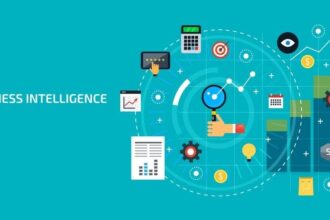Business intelligence (also known as BI) is essential for organizations that seek to make data-driven decisions, optimize performance, and stay competitive in a rapidly evolving market. The BI software market is expected to grow by 18% to more than $18 billion by 2026, indicating the increasing reliance on data analytics. Nevertheless, despite its benefits, G2 author Sagar Joshi reports that the adoption rate of BI tools globally is at 26%, with 4% of organizations struggling to successfully implement them.
- What Is KPI Software?
- Choosing the Right KPI Software
- Business Intelligence (BI) Software
- Performance Management Software
- Financial KPI Software
- Marketing and Sales KPI Tools
- Custom KPI Solutions
- Key Features to Look for in KPI Software
- 1. Customizable Dashboards
- 2. Real-Time Reporting
- 3. Data Integration
- 4. Automation & Alerts
- 5. User-Friendly Interface
- How KPI Software Transforms Business Growth
- Better Decision-Making
- Increased Efficiency
- Stronger Goal Alignment
- Faster Problem-Solving
- Competitive Advantage
- Implementing KPI Software: Best Practices
“Business intelligence (BI) is making a significant impact across industries by helping organizations use data to make better decisions and improve operations. In sectors like healthcare, retail, FinTech, and telecommunications, BI helps businesses uncover key insights, streamline processes, and stay competitive. With the help of BI software, companies can identify trends, assess what’s working, and pinpoint areas for improvement,” Joshi writes.
Interestingly, 52% of software companies are already utilizing BI tools, with their value well demonstrated in tech-oriented industries. Increased usage will hinge on enhanced tools and methodology, enabling organizations to leverage BI for better decision-making and business productivity.
KPI software, particularly Objectives and Key Results (OKR) software, is crucial to tracking performance and correlating business goals with measurable outcomes. Fortune Business Insights reports that the global OKR software market is forecast to grow from $1.15 billion in 2023 to $2.98 billion in 2030 at a CAGR of 14.6%, illustrating the growing demand for systematic performance management solutions. The authors state that it has grown due to the pandemic.
“The COVID-19 pandemic had put immense pressure on all sectors of business, and disrupted the organizations’ operational processes. The pandemic forced many industries to remotely manage their organizational architecture and operational processes, which propelled the demand for OKR software. According to the U.S. Census Bureau, during the COVID-19 pandemic, approximately 5.2% of the American population (about 8 million people) were working from home. Thus, to increase employee communication and the company’s performance using proper tools, the demand for this software increased. Hence, the usage of objectives and key results software in startups and mid-sized companies boosted the market growth during COVID-19.”
Many organizations realize the value of KPI software in the display of raw data as meaningful information, keeping departments aligned with strategic objectives.
As businesses continue emphasizing efficiency and responsibility, KPI software integration into BI tools will be increasingly valuable for sustained prosperity and growth. This helps companies make the most of their BI strategy.
Success isn’t just about working hard—it’s about working smart. And to do that, you need to measure the right things. That’s where KPI software solutions come in. These tools help businesses track, analyze, and optimize key performance indicators (KPIs), ensuring that every decision is backed by data.
But with so many metrics to choose from, how do you know what really matters? And how can KPI software help turn raw numbers into real business growth?
What Is KPI Software?
KPI software is a business intelligence tool that helps companies track performance across different areas, from sales and marketing to operations and finance. Instead of manually compiling reports and crunching numbers in spreadsheets, businesses can use KPI software solutions to automate the process, visualize trends, and make informed decisions.
Why Does It Matter?
Every business has goals, but not all goals are created equal. If you’re tracking the wrong metrics, you might end up wasting time on numbers that don’t actually drive success. KPI software helps businesses:
- Monitor real-time data – See how your business is performing at any given moment.
- Identify trends and patterns – Spot potential problems before they become major issues.
- Improve decision-making – Use data-backed insights instead of gut feelings.
- Boost efficiency – Automate reporting and free up valuable time.
- Align teams – Keep everyone on the same page with clear, measurable objectives.
Now, let’s look at how different types of KPI software solutions can benefit your business.
Choosing the Right KPI Software
Not all KPI software works the same way. Depending on your industry and business goals, different solutions might be a better fit. Here are the main types to consider:
Business Intelligence (BI) Software
BI tools provide in-depth data analysis, helping businesses track KPIs through dashboards, reports, and interactive visuals. These solutions are ideal for companies that deal with large datasets and need advanced analytics to guide their strategy.
Performance Management Software
If your focus is on tracking employee productivity, team performance, or operational efficiency, performance management software is a great option. These tools help set goals, monitor progress, and ensure teams are aligned with business objectives.
Financial KPI Software
For businesses that rely on strong financial health, financial KPI software provides insights into cash flow, profit margins, expenses, and revenue growth. These solutions help companies stay on top of their financial performance and make adjustments as needed.
Marketing and Sales KPI Tools
Sales and marketing teams thrive on data. From conversion rates and customer acquisition costs to ROI and engagement metrics, these tools help businesses optimize their marketing efforts and sales strategies.
Custom KPI Solutions
Some businesses have unique needs that off-the-shelf software can’t fully address. Custom KPI solutions allow companies to tailor dashboards and reports to their specific requirements, ensuring they track the most relevant metrics.
Key Features to Look for in KPI Software
With so many options available, how do you choose the right one? Look for these essential features:
1. Customizable Dashboards
A good KPI tool should let you personalize your dashboard, so you see the most relevant data at a glance.
2. Real-Time Reporting
Waiting for weekly or monthly reports? That’s outdated. Real-time updates let you act on insights immediately.
3. Data Integration
Your KPI software should connect with existing tools like CRM, accounting software, and project management platforms to pull in all necessary data.
4. Automation & Alerts
Set up automated reports and notifications so you’re always aware of important changes.
5. User-Friendly Interface
If your team struggles to navigate the software, they won’t use it. Look for intuitive design and easy navigation.
How KPI Software Transforms Business Growth
Implementing KPI software isn’t just about tracking numbers—it’s about turning data into action. Here’s how businesses benefit:
Better Decision-Making
Having access to accurate, real-time data helps businesses make smarter choices instead of relying on guesswork.
Increased Efficiency
Automated tracking means less time spent on manual reporting and more time focusing on strategy and execution.
Stronger Goal Alignment
Teams work better when they have clear, measurable objectives. KPI software ensures everyone is aligned with business goals.
Faster Problem-Solving
If a key metric starts slipping, you can catch it early and take action before it turns into a bigger issue.
Competitive Advantage
Businesses that use KPI software stay ahead of competitors by continuously refining their strategies based on performance data.
Implementing KPI Software: Best Practices
Want to get the most out of your KPI software? Here’s how to ensure a smooth implementation:
1. Define Your Key Metrics
Start by identifying the most critical KPIs for your business. What truly drives success? What data do you need to measure progress effectively?
2. Set Clear Goals
Make sure your team understands why these KPIs matter. Setting specific, measurable goals will keep everyone focused.
3. Choose the Right Software
Pick a solution that fits your industry, business size, and data needs. Don’t pay for features you won’t use!
4. Train Your Team
Even the best KPI software won’t help if people don’t know how to use it. Invest time in proper training and onboarding.
5. Continuously Review & Adjust
KPI tracking isn’t a one-time effort. Regularly review your metrics, adjust goals, and refine your strategy to stay on track.
Is KPI Software Right for You?
If your business relies on data to make decisions—and let’s be honest, every business should—KPI software is a game-changer. Whether you’re looking to improve efficiency, align teams, or drive revenue growth, tracking the right metrics gives you the power to scale with confidence.
The key is finding the right tool that fits your needs and making sure your team fully embraces it. Once you start using data effectively, you’ll wonder how you ever managed without it.











